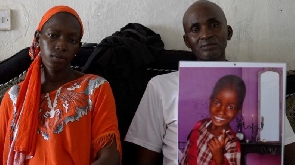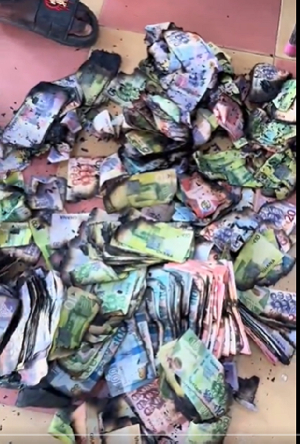September last year, Ebrima Sajnia watch helplessly as im young son die slowly in front of am.
Oga Sajnia, wey dey work as taxi driver for Di Gambia, say im three-year-old Lamin bin dey prepare to start nursery school in a few weeks wen im get fever. One doctor for one local clinic prescribe medicine, including one cough syrup, but im pikin wey get fever bin no gree take dem.
"I force Lamin to drink di syrup," Oga Sajnia tok, as im sidon for im house for Banjul, di capital of Di Gambia.
Ova di next few days, Lamin condition begin worse as im struggle to eat and even piss. Dem admit am for hospital, wia doctors detect kidney issues. Within seven days, Lamin die.
Im bin dey among around 70 children - wey dey younger dan five - wey die for Di Gambia of acute kidney injuries between July and October last year afta dem bin take one of four cough syrups wey one Indian company wey dia name na Maiden Pharmaceuticals make.
For October, di World Health Organization (WHO) bin link di deaths to di syrups, dem say dem don find "unacceptable" levels of toxins for di melecin.
One Gambian parliamentary panel bin also conclude afta dia investigations say dia death na as result of di children taking di syrups.
Both Maiden Pharmaceuticals and di Indian goment don deny di accuse - India tok for December say di syrups follow quality standards wen dem test am for Di Gambia.
Dat report, Amadou Camara, wey be di chairperson of di Gambian panel wey investigate di deaths, no agree wit am at all.
"We get evidence. We bin test these drugs. [Dem] contain unacceptable amounts of ethylene glycol and diethylene glycol, and these dem import direct from India, dem add say na Maiden manufactured am," e tok. Ethylene glycol and diethylene glycol dey dangerous to humans and e fit kill pesin e you take am fatal.
Na difficult situation for Di Gambia, one of di smallest kontries for Africa, wey dey import most of dia melecin from India. Some of di parents wey dia children die say dem no trust Indian-made drugs anymore.
"Wen I read say medicine come from India, I dey barely touch am," na so Lamin Danso, wey lose im nine-month-old son tok.
But di reliance on Indian drugs dey very unlikely to change anytime soon.
"Most pharmacists still dey bring in drugs from India – e dey cheaper than importing drugs from America or Europe," na so tori pesin journalist Mustapha Darboe.
India na di world largest exporter of generic drugs, e dey meet much of di medical needs of developing kontris. But allegations say dia drugs don cause tragedies like di one for Di Gambia - and for oda kontris like Uzbekistan and di US – don raise questions about di manufacturing practices and di quality standards.
"If you see di tragedy, and di kind alarm WHO don raise, so many kontris now dey think twice now. Dem dey check regularly. E no dey very comfortable. I call it an aberration. Na costly aberration," na so Udaya Bhaskar, director general of di Pharmaceuticals Export Promotion Council of India tok.
E say while di incidents like di one forDi Gambia and Uzbekistan don "dent" di Indian pharmaceutical industry image, e no affect exports.
India dey export melecin wey worth $25.4bn (£20bn) for di financial year wey end for March 2023 - of these, $3.6bn na to kontris for Africa. Oga Bhaskar point out say di kontri don already export drugs wey worth more than $6bn for di first quarter of di current financial year.
But India don announce steps wey go make am compulsory for companies to get cough syrup samples tested for goment-approved laboratories before dem export am. Di Gambia, no get drug testing laboratories, don also make dis mandatory for melecin wey dem export from India since July.
India also don set deadlines for dia pharma companies to adopt WHO-standard of good manufacturing practices.
But some Indian activists dey allege say di kontri get a "two-tier manufacturing system" for a long time.
"Wetin we dey export to America and Europe, we dey try and dey use tough standards compared to drugs wey dem dey make for local consumption and di ones we we dey export to less regulated markets," na wetin Dinesh Thakur, one public health activist allege.
But Oga Bhaskar disagree, e say several kontris for Africa -wey be India third-largest export destination – get "ogbonge" regulatory mechanisms.
One recent Gambian goment report on di tragedy wey bin recommend di establishment of a quality control laboratory and two drug regulators dem dismiss am.
"We know say pipo dey vex for society. We know say di victims dey vex well-well," na so Billay G Tunkara, di majority leader of Gambian National Assembly and head of goment business tok.
But devastated parents say nothing don change for di kontri health sector ova di past year -di medical system dey struggle to cope wit di rush of fever cases and some parents bin dey forced to raise funds to send dia children to go Senegal wey be dia neighbour.
Momodou Dambelleh, wey dey sell wood for a living, na one of dem. Di last time im bin see Aminata, im 22-month-old daughter, na for video call as she lie unresponsive for one hospital bed.
"I bin only see her head dey move. I bin dey try to let her know say na me, her papa," e tok. Dat na shortly before she die.
"Di pipo wey commit di crime, including di health minister, suppose face di full force of di law," na so Ebrima EF Saidy tok, tok-tok pesin for a group wey dey represent di parents of di victims.
Dr Ahmadou Lamin Samateh, health minister of di Gambia, no respond to BBC request for interview.
One year on, many of di parents say dem dey determined to make sure say oda pipo for Di Gambia no go experience dis pain again.
Di families of 19 children don sue local health officials and Maiden Pharmaceuticals for Di Gambian high court. Dem say dem go approach Indian and international courts as well if need be.
"Di goment carelessness n aim make di children die," na so Oga Sagnia tok, wey dey part of di group.
BBC Pidgin of Monday, 21 August 2023
Source: BBC




















